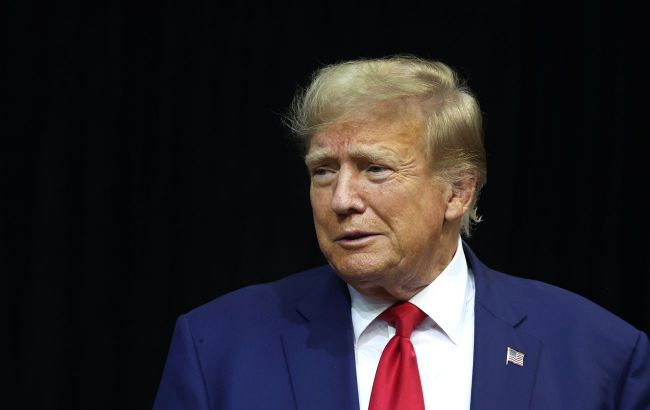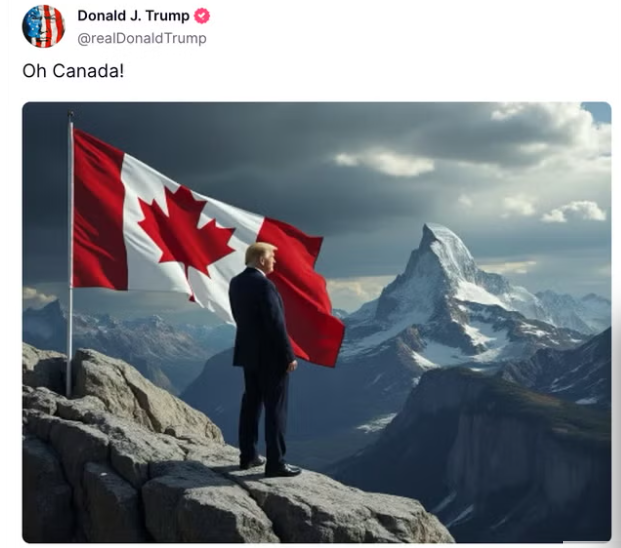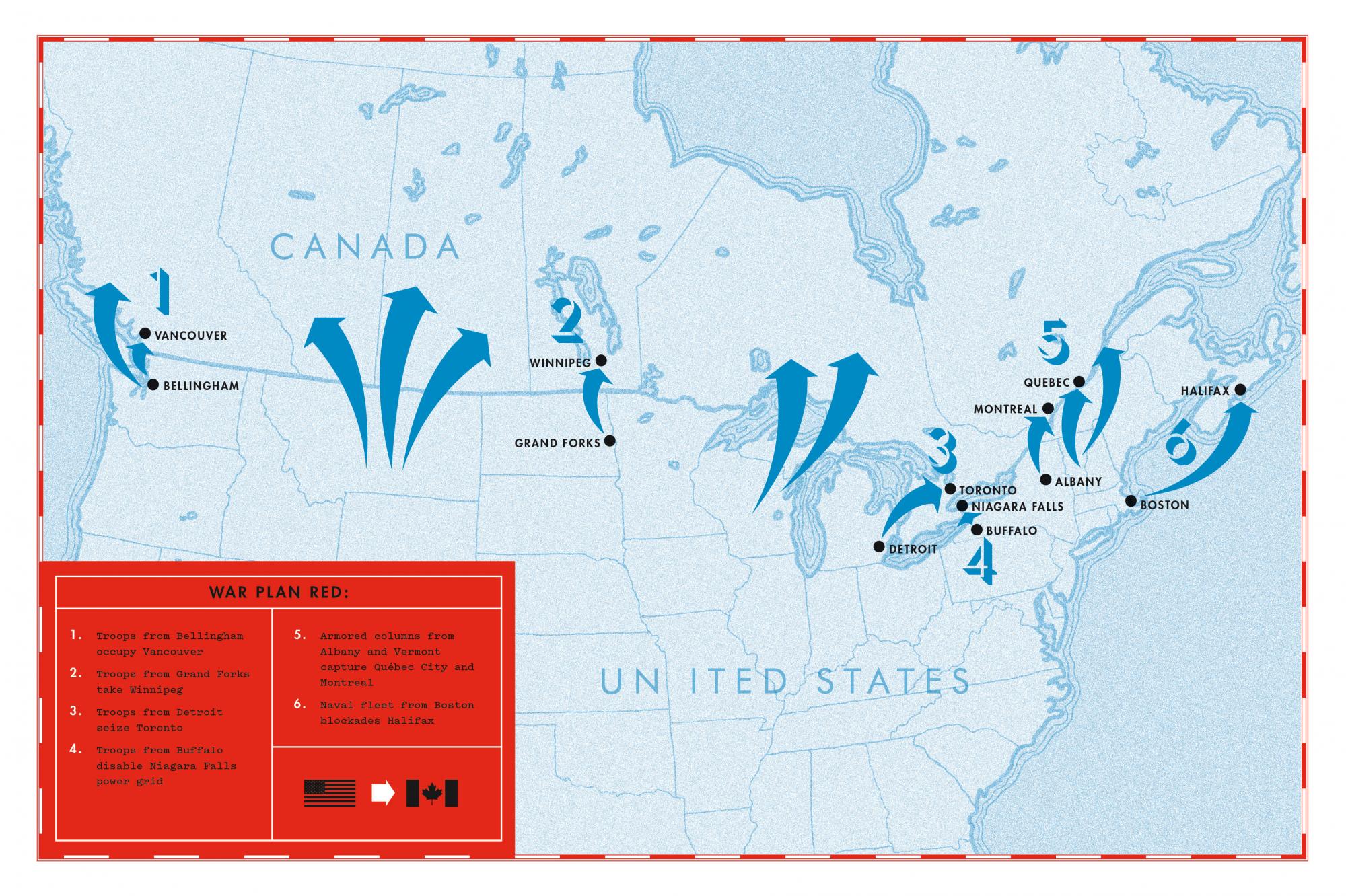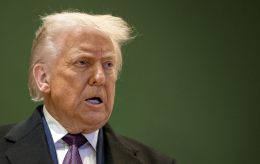Political trolling or serious talk? Why Trump mentions annexing Canada and whether it's possible
 Photo: Donald Trump (Getty Images)
Photo: Donald Trump (Getty Images)
The elected US President, Donald Trump, is now openly talking not only about his desire to make Canada the 51st state but also about being ready to use force - albeit for now, only economic force.
Here’s an overview of why Trump might want to annex Canada, the real strategy behind his actions toward the neighboring country, and how far his threats might go.
Contents
- Trump's rhetoric about Canada
- How Canada is reacting to talk of annexation
- Imperial ambitions? How the US Prepared for invasion in the 20th century
- Does Trump really want to annex Canada, and what’s next
Trump's rhetoric about Canada
In his ambitions regarding the neighboring country, Trump is crossing boundaries both figuratively and literally. He frequently criticizes Canadian leadership, talks about plans to make it the 51st state, and even posts provocative images - such as one featuring himself and the Canadian flag atop a mountain.
Trump’s blatant trolling of Prime Minister Justin Trudeau began after his election victory. He accuses Trudeau of failing to address issues like trade and immigration, threatens to impose 25% tariffs on goods, and, after a meeting in Mar-a-Lago, began referring to Trudeau as the "governor of the great state of Canada."
In a Christmas greeting, Trump once again suggested Canada join the US to reduce taxes by more than 60%. The attacks continued after Trudeau announced his intention to step down as the leader of Canada’s ruling Liberal Party, even though he will remain Prime Minister for a few more months.
At a press conference yesterday, a journalist asked if the 47th US President plans to use military force to annex Canada.
“No, economic force,” Trump replied. “Because Canada and the United States - that would really be something. You’d get rid of an artificially drawn line. And that would be much better for national security.”
_1.jpg) Photo: Donald Trump constantly trolls Justin Trudeau, calling him a "governor" and urging him to join the USA (Getty Images)
Photo: Donald Trump constantly trolls Justin Trudeau, calling him a "governor" and urging him to join the USA (Getty Images)
Trump has also criticized US expenditures on "taking care of Canada." According to him, the US suffers from trade deficits, doesn’t need Canadian lumber, and would be better off if 20% of American cars weren’t made in Canada but in Detroit.
Furthermore, Trump claimed he threatened to cut subsidies to Canada. He alleged that Trudeau responded by saying that Canada might disintegrate under such circumstances.
Yesterday, he posted a map on Instagram showing the US and Canada merged and colored in the American flag.
How Canada is reacting to talk of annexation
Trump’s claims that Canadians want to join the US are, as usual, exaggerated. According to a December poll by Research Co., support for the idea is not particularly strong.
In an online survey of a representative national sample, 26% of Canadians agreed that their country might benefit from becoming the 51st state. However, support for the idea has risen by 8% over the past year.
The idea is most popular in Alberta (30%), followed by Saskatchewan, Manitoba, and Ontario (19% each), Quebec (24%), Atlantic Canada (24%), and British Columbia (18%).
"The appeal of a province joining the United States varies greatly by age, While only 10% of Canadians aged 55 and over perceive benefits, the proportion rises to 27% among those aged 35-to-54 and to 40% among those aged 18-to-34," noted Research Co. President Mario Canseco.
Responding to Trump’s press conference, Canadian Prime Minister Justin Trudeau posted a statement declaring, “There isn’t a snowball’s chance in hell that Canada would become part of the United States.” Billionaire Elon Musk, a reported influential member of Trump’s circle, retweeted Trudeau with the caption, “Girl, you're not the governor of Canada anymore, so doesn't matter what you say,” implying that Canada may have a new Prime Minister by spring.

Photo: Trump's trolling of the Canadian government accompanied by memes (screenshot of a post on Truth Social).
The leader of the opposition Conservative Party, Pierre Poilievre, who has a strong chance of leading the government after the fall elections, sharply responded to Trump.
"Canada will never be the 51st state. Period. We are a great and independent country," he wrote on the social network X.
He also used this opportunity to present his vision for Canada.
"We are the best friend to the US... When I am Prime Minister, we will rebuild our military and take back control of the border to secure both Canada and the US. We will take back control of our Arctic to keep Russia and China out. We will axe taxes, slash red tape and rapidly green-light massive resource projects to bring home paycheques and production to our country," he added.
Imperial ambitions? How the US Prepared for invasion in the 20th century
Meanwhile, it may seem that the prank about annexing Canada is spiraling out of control, at least in American media. Conservative political commentator and Fox News host Jesse Watters expressed a desire to invade the neighboring country.
"Canada... the fact that they don’t want us to take them over makes me want to invade. I want to quench my imperialist thirst," he stated on air.
At first glance, these absurd ambitions have historical roots. Relations between the US and Canada haven't always been as sweet as maple syrup. One only needs to recall 1812, when British Canadian colonial forces entered Washington and burned down the White House. This hostility later evolved into a series of disputes over where exactly the border should be drawn.
Most of these clashes had rather comical names. For instance, the Aroostook War, which lasted from 1838 to 1839, was over logging rights between Maine and New Brunswick. The US Congress even authorized the deployment of 50,000 troops to the north, and as part of the agreements, the size of the state of Maine was increased.
Twenty years later, in 1859, a dispute over a Canadian pig shot on an American farmer’s property led to the deployment of the USS Massachusetts near the San Juan Islands off the coast of Washington state. The governor of Canadian Vancouver ordered an attack, but Royal Navy Rear Admiral Robert Baynes refused, calling it unwise to embroil two nations in the Pig War. Both sides withdrew, and later Canada gained the right to form its government (while remaining part of the British Empire), with the border in that area being established in 1870.
After World War I, which elevated the US, Canadian military leadership in 1919 decided to assess readiness for another world war and tasked officer James "Buster" Sutherland Brown with devising an invasion plan for the US. This resulted in Defense Scheme No. 1, which envisioned a preemptive strike from five directions by "flying columns," capturing Maine and the cities of Portland, Fargo, Niagara, and Albany.
American military planners feared that Great Britain, displeased with the growing power of the US, might launch an invasion from Canada, whose foreign policy was still under British control. They agreed that the best defense was an offense and commissioned a plan for an invasion of Canada.
 Photo: The American invasion plan for Canada developed in 1930 (Princeton Architectural Press)
Photo: The American invasion plan for Canada developed in 1930 (Princeton Architectural Press)
This resulted in War Plan Red - a plan to defeat Britain on Canadian soil, which was essentially a mirror image of Defense Scheme No. 1. It called for a naval blockade of Halifax, attacks from Detroit and Albany to capture Toronto and Montreal, from Bellingham to capture Vancouver, and from Boston to seize Halifax. Simultaneously, forces were to take Niagara Falls and disable Canada’s power grid. A supporter of the Nazis, Charles Lindbergh, who was involved in the plan, even recommended using chemical weapons.
War Plan Red did not assume an easy victory, as the report noted the Canadians’ capacity to fight to the end. Later, Congress allocated $57 million to an updated version of the plan, which included the construction of three "civilian airports" near the border. It was later revealed that these were military airfields, and the story made the front page of The New York Times on May 1, 1935.
Does Trump really want to annex Canada, and what’s next
Donald Trump's tactics regarding Canada are unlikely to be connected to any genuine claims to make it the 51st state. As The Washington Post states, the training of his imperial instincts fits into the logic of his first term, when he aimed to promote US interests without considering the delicacy of border issues and international relations.
Similar comments about Canada, Greenland, and the Panama Canal are part of a broader strategy and a connecting thread to his overarching mission to use all levers to counter Russia and China, Trump's team told The WP.
However, Ukrainian analyst Oleksandr Kraiev from the Foreign Policy Council "Ukrainian Prism" explains the elected president's behavior toward Canada in simpler terms.
"It's definitely not imperial ambitions. It's partly trolling and partly classic Trump-style negotiation tactics. Alongside statements about Canada and the 51st state, he spoke a lot about wanting additional tariffs from the Canadians. He wants to profit from these relations and give protection, not for free," he said in an interview with RBC-Ukraine.
He began talking about annexation after realizing that his proposals for tariffs and increasing Canada's defense spending were not being well received.
"If you understand that your request will be rejected, you need to offer something more radical, and then your initial proposal will seem like a reasonable compromise. So Trump is following the strategies he promotes in his books and public speeches," the analyst explained.
The idea of annexing Canada has some support in the US, but it is only discussed in marginal political circles. "It does not have national support. Of course, it will be hyped up now, and Trump supporters will talk about it. However, believe me, there haven't been any real public debates," Kraiev emphasized.
Regarding Fox News host Jesse Watters, his comments about an invasion are certainly not a reflection of any significant portion of public opinion. Rather, the channel seems to be trying to please Trump and do whatever it takes to get him back on the air.
How far this policy toward Canada might go depends on how much Trump wants to profit from it.
"He wants to make a lot of money, so he'll continue pushing the 51st state issue. There will be many provocations, and we'll hear more sharp statements from him. But I don't think it will escalate to the use of force at all. The most we can expect is tariffs on Canadian goods, which he has promised," the expert added.
Sources: statements by Donald Trump, his social media posts, statements from Canadian Prime Minister Justin Trudeau, Conservative Party leader Pierre Poilievre, publications from Politico, The Washington Post, data from a Research Co. poll, and comments from Foreign Policy Council "Ukrainian Prism" analyst Oleksandr Kraiev.

